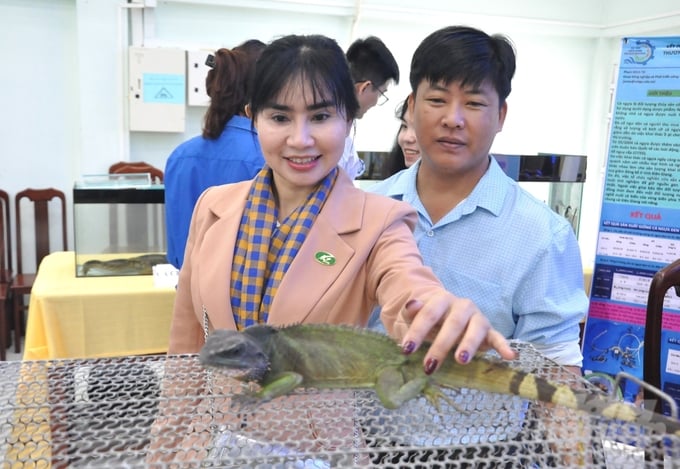June 2, 2025 | 20:52 GMT +7
June 2, 2025 | 20:52 GMT +7
Hotline: 0913.378.918
June 2, 2025 | 20:52 GMT +7
Hotline: 0913.378.918
Chinese water dragons have an exotic appearance with jade blue, green, or gray-brown skins, highlighted by bright, colorful spots. A row of sharp spines runs along their backs from head to tail.
These creatures, known as Physignathus cocincinus, previously populated the wild forests of Phu Quoc Island, Kien Giang province. However, overhunting has led to a rapid decline in their population, bringing them to the brink of extinction.
Chinese water dragons are bred and commercially farmed as part of the scientific project "Research and Development for the Conservation of the Genus Physignathus in Kien Giang Province," led by MSc. Ngo Van Thong, Deputy Head of the Animal Science Faculty at Kien Giang University.
MSc. Ngo Van Thong explained that Chinese water dragon is a species of lizard most commonly found in tropical forests. In Vietnam, they can be found across the northern, central, Central Highlands, and southeastern regions. Notably, they are endemic to the forests of Phu Quoc Island in the southwestern region.
Economic development and climate change have significantly altered their ecological environment, which, in combination with overhunting for food and ornamental purposes, has resulted in their potential extinction.
As a solution to this challenge, the conservation and commercial farming of Chinese water dragons in Kien Giang province help protect biodiversity and provide sustainable economic benefits for the local community.

Successful commercial farming of Chinese water dragons will help reduce pressure on wild populations; and introduce a new avenue for livestock development, thereby attracting local farmers to invest in this initiative. Photo: Trung Chanh.
One of the primary objectives of the second phase of the project "Research and Development for the Conservation of the Genus Physignathus in Kien Giang Province" is to implement a commercial farming model for Chinese water dragons using captive-bred juveniles.
Accordingly, the investment cost for Chinese water dragon farming is inexpensive. Additionally, the enclosures are constructed with concrete pillars and surrounded by iron mesh (B40 mesh), with metal sheets buried 0.5 meters underground and extending 1 meter above ground to prevent the lizards from escaping.
Approximately one-third of the enclosures' roof is covered with metal sheets to provide shelter from rain and sun. The enclosure floor is partially cemented to facilitate feeding and sanitation. The remaining area is covered with sand and dry branches for climbing and resting. The enclosure will also include a small water pool for the lizards' bathing and swimming activities.
Chinese water dragons primarily feed on insects such as worms and crickets in the wild. During the farming process, they will be trained to eat superworms, earthworms, shrimp, fish, and vegetables to ensure a readily available food supply. They should be fed once a day in the morning, with food amounting to approximately 2-3% of their body weight.
Results after nearly one year of commercial farming in Go Quao district have demonstrated that Chinese water dragons can comfortably adapt, grow, and develop in captivity. The project's success contributes to maintaining the sustainable conservation of the Chinese water dragon species in Kien Giang province; reducing pressure on wild populations; and introducing new development avenues for local livestock farmers.
According to MSc. Ngo Van Thong, livestock farmers looking to invest in the commercial farming of Chinese water dragon can receive training at Kien Giang University. The University will also provide farmers with on-site technical advice and guidance during the farming process; thereby encouraging farmers to develop sustainable livestock practices.
The commercial farming of Chinese water dragons is projected to meet market demand, reduce pressure from wildlife hunting, protect wild populations from the risk of extinction, and provide stable incomes for the local community, contributing to sustainable economic development.
Prolonged and intense heatwaves have resulted in a weakened immune system among livestock, which increases the risk of disease outbreaks. Consequently, farmers have actively implemented various measures to protect their animals from heat exposure.
For large-scale livestock production facilities, farmers are recommended to reduce livestock density and stagger their rearing cycles. Furthermore, regular monitoring of indoor temperatures is essential for enclosures. On the other hand, farmers are advised to invest in backup power generators to prevent power outages. Farmers should also improve ventilation in enclosures; or install exhaust fans to enhance air circulation, reduce temperature, and remove harmful gases from the enclosure.
Translated by Nguyen Hai Long

(VAN) Novel process harnesses machine learning to reveal groups of genes that determine how efficiently plants use nitrogen.

(VAN) Several scientists and farmers are experimenting with soil treatment in some key durian-growing regions such as Cai Lay (Tien Giang), Dak Song, Gia Nghia, and Dak R’lap (Dak Nong).
/2025/05/25/4127-3-073637_820.jpg)
(VAN) Thanks to the promotion from an FAO-implemented project, vegetable production in greenhouses in Moc Chau has seen strong development, from 1.5 hectares in 2021 to nearly 50 hectares in 2024.

(VAN) FAO has recently supported USD 140,000 to implement the project 'Risk mitigation human-animal interface risks through disease control initiatives in pig farming.'

(VAN) The People's Committee of Tra Vinh province has approved an adjustment to the investment policy for the Green Hydrogen Plant project, increasing its area to approximately 52.76 hectares.
![Reducing emissions from rice fields: [2] Farmers’ commitment to the soil](https://t.ex-cdn.com/nongnghiepmoitruong.vn/608w/files/news/2025/05/05/dsc08881jpg-nongnghiep-140632.jpg)
(VAN) Clean rice cultivation model in Thuong Tan commune, Bac Tan Uyen district, is assisting local residents in achieving sustainable agriculture by substantially reducing costs, increasing productivity, and protecting the environment.

(VAN) At the conference to disseminate Resolution No. 68, AgriS introduced its digital agricultural ecosystem and reaffirmed its commitment to accompanying the Government in promoting private sector development and sustainable agriculture.